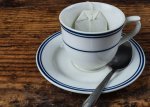Only our VIP Email Subscribers receive exclusive monthly discounts. Subscribe to our newsletter, today!
what are the differences between supermarket tea and specialist tea stores?
This is a question that I am often asked and sometimes it is difficult to answer simply because of the depth and breadth of the response. So this article will attempt to clarify the differences between supermarket tea and specialist tea stores as succinctly as I can!
the differences are vast

When it comes to tea, there is a gap as vast as the Pacific Ocean between the experience and the quality found in the aisles of an average supermarket and the refined atmosphere of a specialist tea store.
Just as there are discernible differences between fast food and a five-star dining experience, similar disparities exist between supermarket tea and teas offered by specialist retailers. After all, you are not merely buying a beverage; your purchase supports an entire ecosystem of artistry and flavour.
So, let's go and explore the differences between supermarket tea and specialist tea stores.
Not all teas are the same, either.
Love Loose Leaf Tea's "English Breakfast" blend is different from Twinings English Breakfast blend, which is different from Maison Freres' blend, which is different from Palais des Thes' blend, which is different from Taylors of Harrogate's blend which is different from...
...you get the picture!
One overwhelming advantage that specialist tea stores have over supermarkets is the sheer variety and rare finds that beckon the adventurous tea lover. Supermarkets rarely venture beyond common black or green tea varieties, which is in stark contrast to the treasure trove of teas that specialist stores offer.
Additionally, as supermarkets have to provide consistency at great scale, small estate and premium tea offerings are difficult for them to provide as their product range has to be mass produced.
A HAVEN FOR DISTINCTIVE TEAS...

Specialist tea stores are a haven for
single-origin teas, distinctive blends, and rare finds. They provide access to
exotic tea types like white tea, blooming tea, Oolong, Pu-erh, and Matcha,
amongst others. Each tea comes from a unique terroir, has its distinctive
flavour profile, and delivers a different taste experience, something you would not often find with supermarket tea!
Beyond the extensive ranges, there is a discernible difference in taste.
The reason?
Specialist stores source their tea from specific regions known for their exceptional quality. Many of these teas come from particular tea estates, bathed in the perfect amount of sunlight and rain, nurtured in nutrient-rich soil, all contributing to a cup of tea that is extraordinary in its flavour and complexity.
METHODS OF PRODUCTION ALSO DIFFER

Every tea estate nurtures its plants and process its tea leaves differently. Different processing styles can result in a black tea that is full-bodied, astringent, and darkly coloured, or one that is lighter, more fragrant, and pale. Although supermarkets also stock some estate teas nowadays, variety is limited, and such teas often remain unnoticed amongst the more demanding popular brands.
The method of production also significantly affects a tea's flavour. Specialist tea stores often supply hand-picked teas carefully processed through time-honoured techniques. Compare that with most supermarket teas, which often feature machine-processed tea leaves, which although efficient, can compromise on the quality and overall taste experience.
One crucial aspect of the tea-making process is the blending.
The expertise of a tea blender, who has decades of training, cannot be understated. This expert knows precisely how to blend different teas from different estates to create a harmonious and unique flavour.
This sort of craftsmanship cannot be replicated on the mass market.
Additionally, most supermarket tea comes in teabag form, containing tea dust or fannings (read more about that here), which is the smallest part of the tea leaf. This results in a quick infusion, but the flavour is often dull and flat compared to loose leaf teas.
If you've been drinking supermarket tea for any length of time, you've likely noticed one thing: it never changes. It's designed for consistency, not adventure. In contrast, specialist tea stores stock seasonal teas, teas from small batches or limited runs, and teas that change as nature does. The differences between supermarket tea and specialist tea stores are in complete contrast in this regard.
Specialist tea stores are the bastions of high-quality loose leaf tea, which consist of whole or partially broken tea leaves. These leaves have the space to unfurl and infuse, releasing complex flavors and delicate nuances into your cup.
tea estates, social responsibility and the environment

Another key advantage of specialist tea stores is the emphasis on sustainable farming. More and more tea estates are focusing on sustainable practices, managing the environment gently and sustainably, and paying their tea workers a fair and reasonable wage.
When you purchase tea from these estates, you're not just buying a beverage. You're driving change globally, ensuring the future of the tea industry, and supporting fair trade.
While it is true that some large scale supermarket tea providers also seek to provide what they call, "ethical tea" I find it hard to see how this is possible for their prices, without compromising on quality, variety and taste.
For me, the purchase of specialty teas has been a conscious choice to align myself with brands that value quality over mass production, artisan craftsmanship over industrial manufacturing, and sustainability over profit.
When you purchase from a specialty tea retailer, you also contribute to your own local economy. Your patronage helps keep local retailers thriving amidst the increasing competition from supermarkets and online marketplaces. Not to mention the boost it brings to the global tea farming communities through fair trade practices!
Love Loose Leaf Tea suppliers routinely seek to ensure the quality and value of the tea they provide, as well as the the sustainable social and environmental practices of the tea estates concerned.
CUSTOMER SERVICE, details AND PERSONALISATION

The role of customer service in enhancing your overall tea buying experience cannot be overstated. Specialist tea shops often provide excellent customer service. Knowledgeable staff are there to guide you through the vast world of tea and help you find the tea that best suits your palate, and to provide you with an unparalleled retail experience.
A specialist tea retailer elevates the humble cup of tea to an art form. Their expertise promises not only quality but also an experience. This kind of attentive service is completely absent in supermarkets.
You're paying for more than just tea when you buy from specialty shops. You're supporting artisanal craftsmanship, centuries of tradition, and hard-earned expertise. You are purchasing the result of passion, dedication, and commitment.
What's more, shopping at specialty tea stores can make you feel better about yourself. You get to sip on a cup of tea that's been curated from the best tea estates across the globe. You savour the richness of flavours, appreciate the knowledge and expertise of the blenders all while knowing you're contributing to responsible sustainability in a centuries-old industry. (I know I do!)
In fact, I regularly visit and support other specialty tea shops to try their teas. Their suppliers are different from mine and I love to ask questions about the brews they place before me. I can see their passion behind their words and I find it really uplifting!
so, what are the differences between supermarket tea and specialist tea stores?

So in conclusion, I think that the differences between supermarket tea and specialist tea stores is profound. Although supermarket teas have their role in our cupboards, they offer a limited and less exciting spectrum of what's possible with tea.
Tea deserves to be treated as something more than just a beverage; it's a gateway to different cultures, a reflection of passion, and a testament to the mastery of craft. It's an experience, a personal moment of luxury that you can enjoy every day.
Specialty tea shops provide this experience. They can educate you on types of Orange Pekoe, offer an invitation to embark on a journey that might take you across tea gardens in the misty hills of Darjeeling or the emerald landscapes in Japan (where I once lived!). With every sip of specialty tea, you're taken on a sensorial adventure.
By switching from supermarket to specialty loose leaf tea, you're not just upgrading your tea - you're elevating every element of your tea-drinking experience.
So the next time you fancy a cuppa, consider stepping into the tranquil universe of a specialty tea store. You might even see me there!
11 October 2023
now, it's over to you! what's your opinion?
Comments
Like to make a comment? Be my guest!
SHARE THIS PAGE TO YOUR SOCIAL CHANNELS
Available now
REFLECTIONS IN TEA
A MINDFULNESS
JOURNAL

Reflections in Tea A Mindfulness Journal is an un-dated writing journal with over 147 tea-inspired mindfulness prompts to encourage you to take time to reflect, in the present moment.


